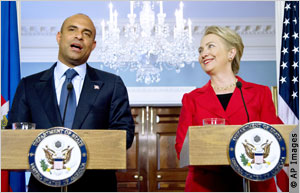U.S. and Haiti Partner for Stability and Prosperity
Washington, DC — Haitian Prime Minister Laurent Lamothe’s visit to Washington offered an opportunity to take stock of Haiti’s accomplishments as it continues its recovery from natural disaster, as well as a chance to assess the continuing challenges that lie ahead, Secretary of State Hillary Rodham Clinton said.
Speaking with Lamothe July 24 at the State Department, Clinton said the January 12, 2010, earthquake exacerbated challenges Haiti was already facing, such as poverty and high unemployment, and the Obama administration has focused U.S. support on improving the country’s agricultural sector, health care, infrastructure and the rule of law.
Clinton said she made Haiti a U.S. foreign policy priority when she assumed office in 2009 and made a commitment to “change the way that we partnered with Haiti, moving from working in Haiti to working with Haiti.”
Following the earthquake, “we scrambled to make sure we were being a good partner in helping Haiti recover from such devastation, but at the same time, working with them to help build a firm foundation for more prosperity and stability,” she said.
The secretary said the first factory in the landmark Caracol Industrial Park in northern Haiti has begun operations, and the project has just signed its second tenant. Caracol “captures an integrated, sustainable approach to economic development” and is “drawing companies and will create more than 20,000 new jobs for Haitians,” she said. Nearby, construction is under way on more than 1,200 homes that will have electricity, water and sanitation, and are designed to withstand hurricanes and earthquakes, she said.

Haitian Prime Minister Laurent Lamothe and Secretary of State Hillary Clinton.
Prime Minister Lamothe said the park is “a development model that we want to replicate and that we want to support” to help bring down the country’s high unemployment rate. He said that 20,000 new jobs will generate 10 to 20 percent more economic opportunities.
“That means over [100,000] to 200,000 people will benefit from that park. That’s why it’s important to not only promote the park, but seek additional tenants and improve the capacity of that park to make it a big success. And once it’s inaugurated in October … we assure that the rest of the world will see what us Haitians see, which is a success story,” Lamothe said.
Clinton said the United States has also been working to improve Haiti’s agricultural sector through its Feed the Future Initiative. So far the program has provided nearly 10,000 Haitian farmers with better seeds, fertilizer and techniques to improve productivity. As a result, Clinton said, rice yields have more than doubled and corn yields have more than quadrupled, and the program is seeking to expand over the next few years to help 100,000 Haitian farmers.
The secretary said Haiti’s cholera fatality rate has fallen from 9 percent to just over 1 percent, and the United States has been working with its partners in Haiti and the health sector to help make that happen.
“But we know that the only way to stop cholera long term is through improved water and sanitation. So we’re working with the Inter-American Development Bank and other donors on water, sanitation and hygiene programs. And we’re working to upgrade health clinics in Haiti and to renovate the general hospital in Port-au-Prince in partnership with France,” she said.
The United States has helped to remove more than 2 million cubic meters of rubble and worked with the Haitian government to return more than 1 million people who had been displaced by the earthquake to temporary shelters and safer homes, Clinton said.
The secretary also praised the Haitian government’s reforms, including standing up a superior judiciary council and making the current government the first to have its executive, legislative and judicial branches functioning concurrently since 1987.
In making their country more stable, “Haitians have been in the lead at each step,” she said, taking ownership and setting priorities.
“The United States can be helpful, but what’s really important is building the capacity of the Haitian government and the Haitian society so they can have the means and the experience and the expertise to solve their own problems,” she said.
Lamothe said the Haitian government is working to move the country away from its dependence on international assistance.
“We are building our capacity to … increase the tax revenues, increase the custom duty revenue, decrease spending on energy subsidies to increase, again, government revenues,” he said. The government is also investing in an infrastructure project to provide electricity throughout the island, he said.

